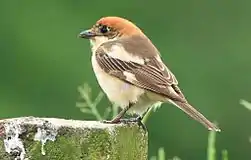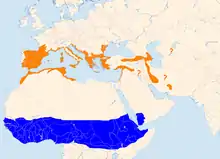Woodchat shrike
The woodchat shrike (Lanius senator) is a member of the shrike family Laniidae. The genus name, Lanius, is derived from the Latin word for "butcher", and some shrikes are also known as "butcher birds" because of their feeding habits. The specific senator is Latin for "senator", so-named because its chestnut cap recalled the colour of the stripe on the toga of a Roman senator.[3] The common name "Woodchat" is an Anglicisation of German waldkatze, literally "woodcat",[4] and "shrike" is from Old English scríc, "shriek", referring to the shrill call.[5]
| Woodchat shrike | |
|---|---|
 | |
| Scientific classification | |
| Kingdom: | Animalia |
| Phylum: | Chordata |
| Class: | Aves |
| Order: | Passeriformes |
| Family: | Laniidae |
| Genus: | Lanius |
| Species: | L. senator |
| Binomial name | |
| Lanius senator | |
 | |
Summer Winter[2] | |
The woodchat shrike breeds in southern Europe, the Middle East and northwest Africa, and winters in tropical Africa. It breeds in open cultivated country, preferably with orchard trees and some bare or sandy ground.[6]
Description
The male is a striking bird with black and white upper parts, a chestnut crown and pure white underparts. The race L. s. badius of the western Mediterranean lacks the large white wing patches. In the female and young birds, the upperparts are brown and white and vermiculated. Underparts are buff and also vermiculated.[6]
Distribution and habitat
The breeding range of the woodchat shrike is in southern Europe, northern Africa and the Middle East. The range extends from Portugal to Greece, Turkey, Iraq and Iran, and from Mauritania and Western Sahara in northern Africa to Libya. This bird overwinters in tropical central Africa, its winter range extending from Senegal to Sudan and Ethiopia in the east and southwards to Gabon.[1]
Behaviour and ecology
This migratory medium-sized passerine eats large insects, small birds and amphibians. Like other shrikes it hunts from prominent perches, and impales corpses on thorns or barbed wire as a "larder". This species often overshoots its breeding range on spring migration, and is a rare, but annual, visitor to Great Britain. The Balearic race badius has occurred in Britain around four times as a vagrant, and has also been recorded once in Ireland.[6]
Gallery
 Adults
Adults.jpg.webp) Juvenile
Juvenile Eggs
Eggs Illustration
Illustration.jpg.webp) On a stamp of North Macedonia
On a stamp of North Macedonia
References
- BirdLife International (2017). "Lanius senator (amended version of 2016 assessment)". The IUCN Red List of Threatened Species. 2017: e.T22705095A118777394. doi:10.2305/IUCN.UK.2017-3.RLTS.T22705095A118777394.en.
- Tony Harris & Kim Franklin (2000). Shrikes and Bush-Shrikes. Helm. ISBN 978-0-7136-3861-5.
- Jobling, James A (2010). The Helm Dictionary of Scientific Bird Names. London: Christopher Helm. pp. 219, 353. ISBN 978-1-4081-2501-4.
- "Woodchat". Oxford English Dictionary (Online ed.). Oxford University Press. (Subscription or participating institution membership required.)
- "Shrike". Oxford English Dictionary (Online ed.). Oxford University Press. (Subscription or participating institution membership required.)
- Norbert Lefranc; Tim Worfolk (2013). Shrikes. A&C Black. pp. 159–165. ISBN 978-1-4081-8756-2.
External links
 Media related to Lanius senator at Wikimedia Commons
Media related to Lanius senator at Wikimedia Commons Data related to Lanius senator at Wikispecies
Data related to Lanius senator at Wikispecies- Lanius senator in Field Guide: Birds of the World on Flickr
- "Lanius senator". Avibase.

- Woodchat shrike videos, photos & sounds on the Internet Bird Collection
- Oiseaux, pictures (in French)
- Ageing and sexing (PDF; 2.4 MB) by Javier Blasco-Zumeta & Gerd-Michael Heinze
